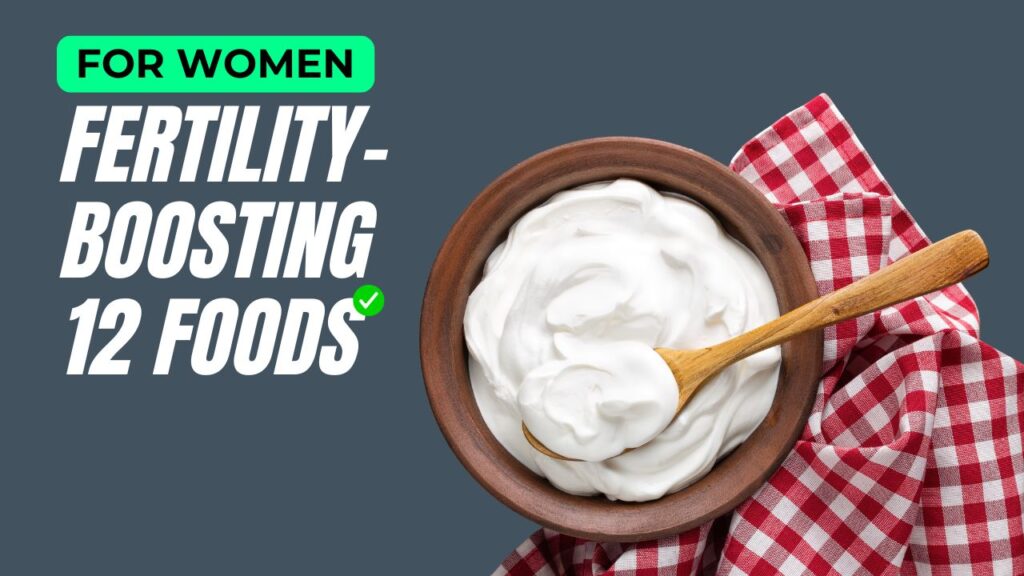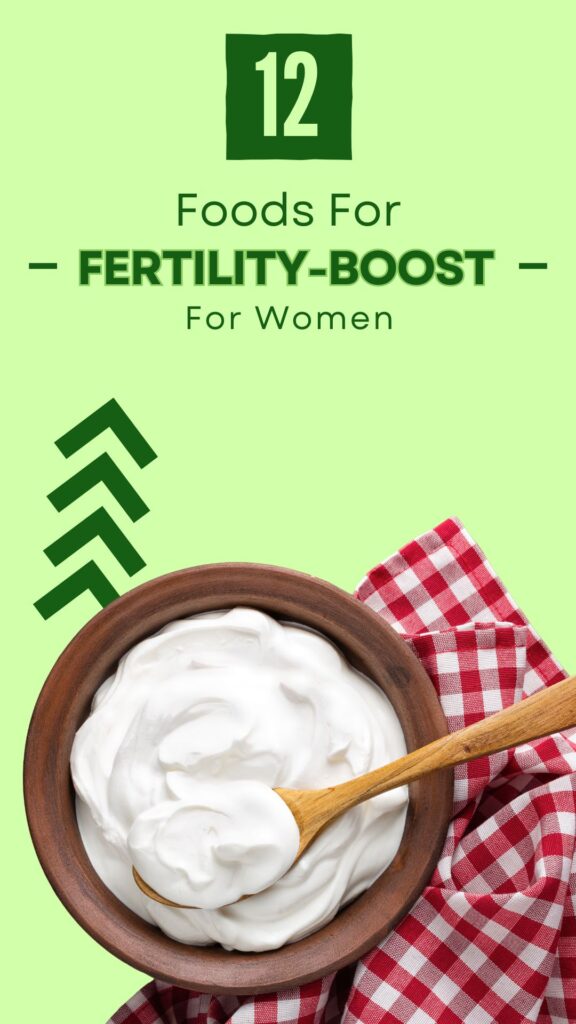Some links in this blog are affiliate links. If you make a purchase through these links, I may receive a small commission. This helps support the site at no extra cost to you.
Do you know that nearly 1 in 8 couples struggle with infertility worldwide? While medical treatments and lifestyle changes play a role, what you eat can significantly influence reproductive health.
Certain foods are rich in essential nutrients that improve hormone balance, support egg quality, regulate ovulation, and enhance overall fertility.
This article explores 12 powerful fertility-boosting foods for women, along with how to eat them, who should include them in their diet, storage tips, do’s and don’ts, and possible side effects.
Here’s what you’ll learn:
- The top fertility-friendly foods backed by nutrition science
- The best ways to enjoy them for maximum nutrient absorption
- Who should eat or avoid each food
- Practical buying, storage, and usage tips
Let’s dive into the list and discover how small dietary choices can make a big difference in your fertility journey.

Table of Contents

12 Best Fertility-Boosting Foods
1. Leafy Greens (Spinach, Kale, Swiss Chard)
Leafy greens are packed with folate, iron, calcium, and antioxidants—all essential for reproductive health. Folate helps in egg development and prevents neural tube defects during pregnancy.
Best Ways to Eat or Use It
- Add to smoothies for a quick boost.
- Use in salads with olive oil to increase nutrient absorption.
- Lightly steam to preserve vitamins.
Who Should Eat / Avoid
- Good for: Women trying to conceive, those with iron deficiency, and during pre-pregnancy planning.
- Avoid/Limit if: You have kidney stones (high oxalate content).
Storage & Buying Tips
- Choose fresh, dark-colored leaves without yellow spots.
- Store in a breathable bag in the fridge; consume within 3–5 days.
Do’s & Don’ts
✅ Do: Pair with citrus fruits to enhance iron absorption.
❌ Don’t: Overcook, as heat reduces folate content.
Possible Side Effects
Excessive intake may cause bloating or interfere with calcium absorption due to oxalates.
2. Eggs
Eggs are a fertility superfood because they’re high in choline, vitamin D, and protein. The yolk especially supports hormone regulation and reproductive health.
Best Ways to Eat or Use It
- Boiled, scrambled, or poached for breakfast.
- Add to baked goods or salads.
Who Should Eat / Avoid
- Good for: Women planning pregnancy; those needing high-quality protein.
- Avoid/Limit if: You have high cholesterol issues.
Storage & Buying Tips
- Buy free-range or organic eggs for higher nutrient density.
- Store in the fridge and consume within 2–3 weeks.
Do’s & Don’ts
✅ Do: Eat the yolk—it has most of the nutrients.
❌ Don’t: Eat raw eggs (risk of salmonella).
Possible Side Effects
Excessive consumption may raise cholesterol levels in sensitive individuals.
3. Berries (Blueberries, Strawberries, Raspberries)
Berries are rich in antioxidants that protect eggs from oxidative stress, which can damage fertility.
Best Ways to Eat or Use It
- Blend into smoothies.
- Top yogurt or oatmeal.
- Eat as a snack.
Who Should Eat / Avoid
- Good for: Women over 30 (egg quality support).
- Avoid/Limit if: You have fructose intolerance.
Storage & Buying Tips
- Choose firm, brightly colored berries.
- Store unwashed in the fridge; wash just before eating.
Do’s & Don’ts
✅ Do: Buy organic if possible (berries are prone to pesticide residue).
❌ Don’t: Leave at room temperature for too long—they spoil quickly.
Possible Side Effects
Eating too many may cause stomach upset due to natural sugars.
4. Avocados
Avocados provide monounsaturated fats, vitamin E, and folate, all linked to improved fertility and hormonal balance.
Best Ways to Eat or Use It
- Mash on whole-grain toast.
- Blend into smoothies.
- Add to salads with lemon juice.
Who Should Eat / Avoid
- Good for: Women with PCOS, hormone imbalance, or planning pregnancy.
- Avoid/Limit if: You’re on a low-fat diet.
Storage & Buying Tips
- Buy firm avocados and let them ripen at room temperature.
- Store ripe avocados in the fridge to extend shelf life.
Do’s & Don’ts
✅ Do: Pair with tomatoes to boost lycopene absorption.
❌ Don’t: Leave cut avocado exposed—it browns quickly.
Possible Side Effects
Overeating may cause weight gain due to high calorie content.
5. Fatty Fish (Salmon, Sardines, Mackerel)
These are rich in omega-3 fatty acids that regulate hormones, improve cervical mucus, and increase blood flow to reproductive organs.
Best Ways to Eat or Use It
- Grill or bake with herbs.
- Add to salads or grain bowls.
Who Should Eat / Avoid
- Good for: Women with irregular cycles or inflammation issues.
- Avoid/Limit if: Pregnant women (choose low-mercury fish).
Storage & Buying Tips
- Opt for wild-caught fish when possible.
- Store in the coldest part of the fridge; consume within 1–2 days.
Do’s & Don’ts
✅ Do: Combine with leafy greens for a nutrient-packed meal.
❌ Don’t: Fry—it reduces omega-3 benefits.
Possible Side Effects
High intake of certain fish may increase mercury exposure.
6. Nuts & Seeds (Almonds, Walnuts, Flaxseeds, Pumpkin Seeds)
These are excellent sources of healthy fats, zinc, selenium, and vitamin E, all crucial for fertility.
Best Ways to Eat or Use It
- Sprinkle on yogurt, smoothies, or oatmeal.
- Eat a handful as snacks.
- Grind flaxseeds for better absorption.
Who Should Eat / Avoid
- Good for: Women with hormonal imbalances.
- Avoid/Limit if: You have nut allergies.
Storage & Buying Tips
- Buy raw, unsalted varieties.
- Store in airtight containers away from heat.
Do’s & Don’ts
✅ Do: Rotate between different nuts/seeds for variety.
❌ Don’t: Overeat—they’re calorie-dense.
Possible Side Effects
May cause digestive issues if consumed in excess.
7. Beans & Lentils
These plant-based proteins are high in iron and folate, which support ovulation and healthy egg production.
Best Ways to Eat or Use It
- Add to soups, stews, and curries.
- Use in salads or grain bowls.
Who Should Eat / Avoid
- Good for: Women following vegetarian or vegan diets.
- Avoid/Limit if: You have digestive issues like bloating (soak before cooking to reduce).
Storage & Buying Tips
- Store dried beans in airtight containers.
- Cook in bulk and freeze portions.
Do’s & Don’ts
✅ Do: Pair with vitamin C-rich foods for better iron absorption.
❌ Don’t: Eat undercooked beans—they can cause stomach upset.
Possible Side Effects
May cause gas and bloating if not soaked/cooked properly.
8. Whole Grains (Quinoa, Brown Rice, Oats)
Whole grains stabilize blood sugar and provide complex carbs, B vitamins, and fiber, helping regulate ovulation.
Best Ways to Eat or Use It
- Replace white rice with brown rice.
- Make oatmeal for breakfast.
- Use quinoa in salads.
Who Should Eat / Avoid
- Good for: Women with PCOS or irregular cycles.
- Avoid/Limit if: You have gluten sensitivity (opt for gluten-free grains like quinoa).
Storage & Buying Tips
- Keep in sealed containers to avoid pests.
- Store in a cool, dry place.
Do’s & Don’ts
✅ Do: Soak before cooking for better digestion.
❌ Don’t: Rely only on refined grains.
Possible Side Effects
Excess intake may cause bloating.
9. Greek Yogurt
Rich in protein, calcium, and probiotics, Greek yogurt supports reproductive health by improving gut microbiome and hormone balance.
Best Ways to Eat or Use It
- Enjoy as a snack with fruits and nuts.
- Add to smoothies.
Who Should Eat / Avoid
- Good for: Women needing more protein and calcium.
- Avoid/Limit if: Lactose intolerant.
Storage & Buying Tips
- Choose unsweetened, plain Greek yogurt.
- Store in the fridge and consume within a week of opening.
Do’s & Don’ts
✅ Do: Combine with berries for an antioxidant boost.
❌ Don’t: Buy flavored varieties high in sugar.
Possible Side Effects
May cause digestive discomfort for lactose-sensitive individuals.
10. Citrus Fruits (Oranges, Lemons, Grapefruit)
Citrus fruits provide vitamin C, which improves iron absorption and protects eggs from free radical damage.
Best Ways to Eat or Use It
- Drink fresh citrus juice.
- Add lemon to water.
- Snack on oranges.
Who Should Eat / Avoid
- Good for: Women with low immunity or iron deficiency.
- Avoid/Limit if: You have acid reflux.
Storage & Buying Tips
- Select firm, brightly colored fruits.
- Store in the fridge for longer shelf life.
Do’s & Don’ts
✅ Do: Pair with leafy greens for maximum benefits.
❌ Don’t: Overconsume juice—it’s high in natural sugars.
Possible Side Effects
Too much citrus may erode tooth enamel.
11. Sweet Potatoes
Sweet potatoes are loaded with beta-carotene and fiber, which regulate hormone production and improve reproductive health.
Best Ways to Eat or Use It
- Bake or roast with olive oil.
- Mash as a side dish.
Who Should Eat / Avoid
- Good for: Women with irregular periods or PCOS.
- Avoid/Limit if: You have kidney stone issues.
Storage & Buying Tips
- Store in a cool, dark place (not fridge).
- Consume within 2–3 weeks.
Do’s & Don’ts
✅ Do: Pair with healthy fats for better absorption.
❌ Don’t: Store in plastic bags (they need airflow).
Possible Side Effects
Overeating may cause digestive upset.
12. Dark Chocolate
Yes, chocolate can boost fertility—in moderation. Dark chocolate contains antioxidants that improve blood flow to reproductive organs.
Best Ways to Eat or Use It
- Enjoy a small piece after meals.
- Add cocoa powder to smoothies.
Who Should Eat / Avoid
- Good for: Women under stress (dark chocolate reduces cortisol).
- Avoid/Limit if: You are sensitive to caffeine.
Storage & Buying Tips
- Choose 70% or higher cocoa content.
- Store in a cool, dry place.
Do’s & Don’ts
✅ Do: Enjoy small portions for antioxidant benefits.
❌ Don’t: Overeat—it contains sugar and calories.
Possible Side Effects
Too much may cause weight gain or caffeine-related insomnia.
Conclusion
Fertility isn’t just about medical treatments—it’s also deeply connected to your diet. These 12 fertility-boosting foods for women—from leafy greens and fatty fish to berries and dark chocolate—offer essential nutrients that support hormonal balance, egg quality, and overall reproductive health.
By making mindful food choices, you’re not just nourishing your body—you’re preparing it for one of the most important journeys of life.
Try adding one or two of these foods into your next meal and see how your energy and well-being improve.
Which of these foods is your favorite for boosting fertility? Share your go-to recipe or snack idea in the comments below!
Frequently Asked Questions (FAQs)
What foods increase fertility in women fast?
Foods rich in folate, antioxidants, omega-3s, and protein—like leafy greens, eggs, fatty fish, nuts, and berries—can support fertility when included consistently in your diet.
How do leafy greens help with fertility?
Leafy greens like spinach and kale are packed with folate and iron, which improve egg health and support ovulation.
Is avocado good for fertility?
Yes, avocados are rich in monounsaturated fats, vitamin E, and folate, all of which help regulate hormones and improve reproductive health.
Can eating eggs improve chances of conceiving?
Eggs are a great source of choline, vitamin D, and high-quality protein, which play a role in hormone regulation and overall fertility.
Which fruits boost fertility in women?
Berries and citrus fruits are among the best fertility-friendly fruits because they are high in antioxidants and vitamin C, which protect eggs from damage.
Are nuts and seeds good for female fertility?
Yes, almonds, walnuts, flaxseeds, and pumpkin seeds provide healthy fats, zinc, and vitamin E that support hormone balance and egg health.
How do omega-3 fatty acids affect fertility?
Omega-3s from fatty fish like salmon improve blood flow to reproductive organs, regulate hormones, and enhance egg quality.
Can Greek yogurt help with fertility?
Greek yogurt provides protein, calcium, and probiotics that balance hormones and support a healthy gut, which indirectly benefits fertility.
Should women avoid any foods when trying to conceive?
It’s best to limit processed foods, excessive sugar, alcohol, and high-mercury fish, as they may negatively impact reproductive health.
How long does it take for fertility-boosting foods to work?
There is no fixed timeline—it depends on your overall health and lifestyle. Consistently eating fertility-friendly foods for several months may improve reproductive health.










